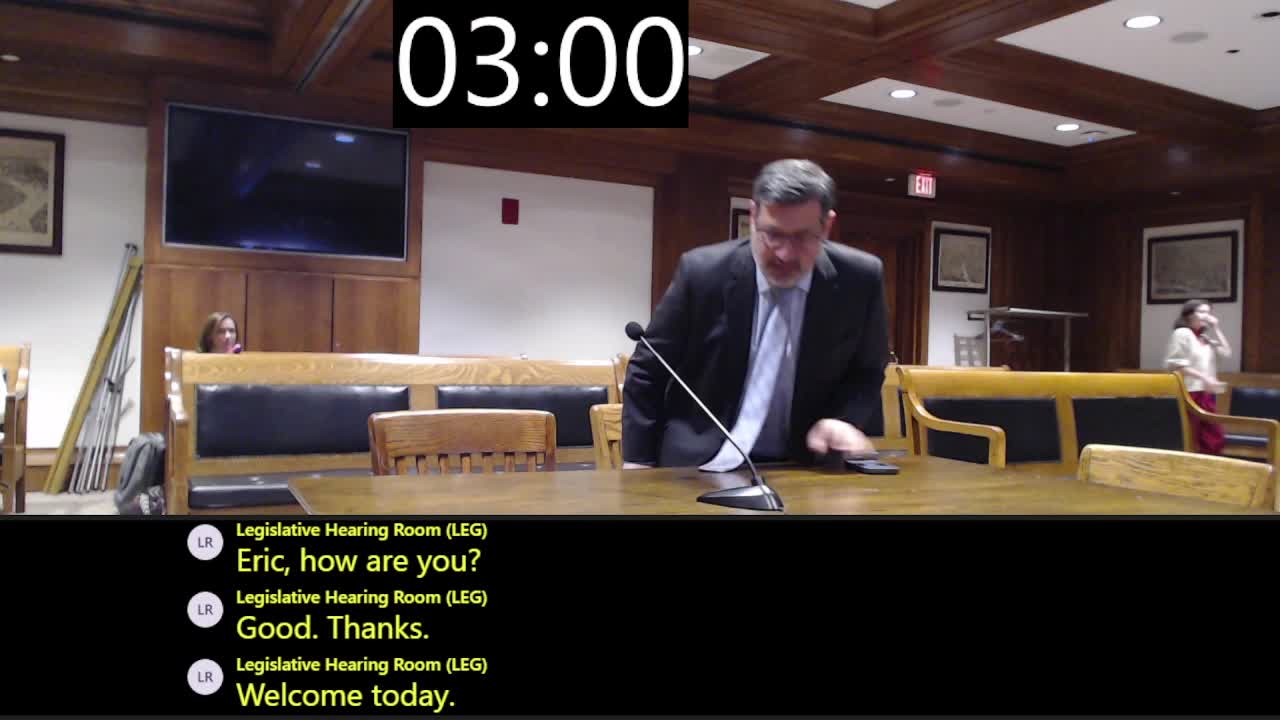Brokers, Employers Urge Committee to Protect Health Savings Accounts, Back Small‑Business Incentives
October 01, 2025 | 2025 Legislature MA, Massachusetts
This article was created by AI summarizing key points discussed. AI makes mistakes, so for full details and context, please refer to the video of the full meeting. Please report any errors so we can fix them. Report an error »

Representatives of employee benefit brokers, small businesses and trade groups urged the Joint Committee on Financial Services to adopt language that would protect health savings accounts from unintended disqualification if the state enacts future benefit mandates.
“My clients rely on HSAs as a tax‑favored way to meet large out‑of‑pocket costs,” said Eric Halko, an employee benefits broker and small‑business owner. Halko testified in support of a bill he identified as “11 85,” saying the measure would create a simple carve‑out so that future state mandates do not render HSA‑compatible plans ineligible for federal tax treatment.
Ryan Kearney, general counsel for the Retailers Association of Massachusetts, testified in favor of Senate 798 (described to the committee as legislation to provide small‑business insurance incentives). Kearney said insurers should be allowed to offer back‑end, year‑end incentives and to reward participation in small‑business group purchasing cooperatives, a tool he said helps reduce administrative costs and improve utilization management.
Bill Stewart, former insurance industry executive and vice president of a state chapter of the National Association of Brokers and Insurance Professionals, told the committee average deductibles are high — “more than $2,000 for an individual and more than $4,000 for a family” — and stressed that preserving HSA eligibility helps individuals stretch retirement and medical dollars. “If a mandate would disqualify people from funding an HSA, then that mandate would not apply to HSA‑qualified plans,” Stewart said, describing a proposal already recommended by national HSA groups.
Witnesses said the proposed protections would not add state spending, and they framed the change as an efficiency measure to avoid repeated statutory fixes after each new mandate. Committee members asked about contribution limits and whether HSAs roll over; witnesses said contribution limits change annually and that accounts carry over year to year. Halko provided a 2026 example, saying a family could contribute nearly $9,000 under federal limits, and noted the accounts can be invested.
Why it matters: witnesses said the measures are designed to keep small employers in the merged market, reduce churn into self‑insurance or professional employer organizations, and preserve a widely used tax‑favored savings vehicle for health costs.
No committee action was taken on the bills during the hearing.
“My clients rely on HSAs as a tax‑favored way to meet large out‑of‑pocket costs,” said Eric Halko, an employee benefits broker and small‑business owner. Halko testified in support of a bill he identified as “11 85,” saying the measure would create a simple carve‑out so that future state mandates do not render HSA‑compatible plans ineligible for federal tax treatment.
Ryan Kearney, general counsel for the Retailers Association of Massachusetts, testified in favor of Senate 798 (described to the committee as legislation to provide small‑business insurance incentives). Kearney said insurers should be allowed to offer back‑end, year‑end incentives and to reward participation in small‑business group purchasing cooperatives, a tool he said helps reduce administrative costs and improve utilization management.
Bill Stewart, former insurance industry executive and vice president of a state chapter of the National Association of Brokers and Insurance Professionals, told the committee average deductibles are high — “more than $2,000 for an individual and more than $4,000 for a family” — and stressed that preserving HSA eligibility helps individuals stretch retirement and medical dollars. “If a mandate would disqualify people from funding an HSA, then that mandate would not apply to HSA‑qualified plans,” Stewart said, describing a proposal already recommended by national HSA groups.
Witnesses said the proposed protections would not add state spending, and they framed the change as an efficiency measure to avoid repeated statutory fixes after each new mandate. Committee members asked about contribution limits and whether HSAs roll over; witnesses said contribution limits change annually and that accounts carry over year to year. Halko provided a 2026 example, saying a family could contribute nearly $9,000 under federal limits, and noted the accounts can be invested.
Why it matters: witnesses said the measures are designed to keep small employers in the merged market, reduce churn into self‑insurance or professional employer organizations, and preserve a widely used tax‑favored savings vehicle for health costs.
No committee action was taken on the bills during the hearing.
View full meeting
This article is based on a recent meeting—watch the full video and explore the complete transcript for deeper insights into the discussion.
View full meeting
